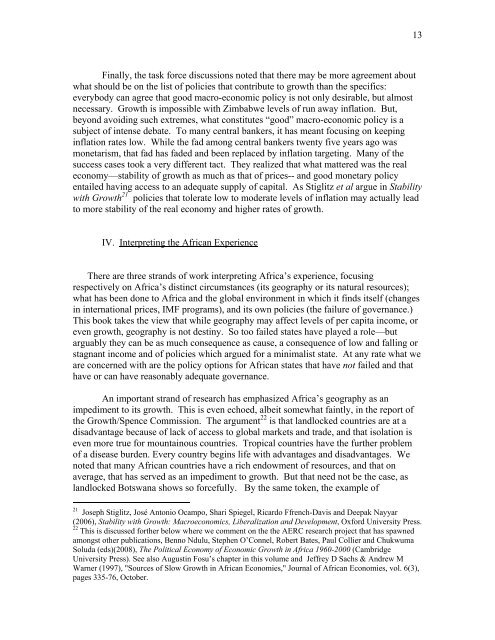Paper - Initiative for Policy Dialogue
Paper - Initiative for Policy Dialogue
Paper - Initiative for Policy Dialogue
Create successful ePaper yourself
Turn your PDF publications into a flip-book with our unique Google optimized e-Paper software.
13<br />
Finally, the task <strong>for</strong>ce discussions noted that there may be more agreement about<br />
what should be on the list of policies that contribute to growth than the specifics:<br />
everybody can agree that good macro-economic policy is not only desirable, but almost<br />
necessary. Growth is impossible with Zimbabwe levels of run away inflation. But,<br />
beyond avoiding such extremes, what constitutes “good” macro-economic policy is a<br />
subject of intense debate. To many central bankers, it has meant focusing on keeping<br />
inflation rates low. While the fad among central bankers twenty five years ago was<br />
monetarism, that fad has faded and been replaced by inflation targeting. Many of the<br />
success cases took a very different tact. They realized that what mattered was the real<br />
economy—stability of growth as much as that of prices-- and good monetary policy<br />
entailed having access to an adequate supply of capital. As Stiglitz et al argue in Stability<br />
with Growth 21 policies that tolerate low to moderate levels of inflation may actually lead<br />
to more stability of the real economy and higher rates of growth.<br />
IV. Interpreting the African Experience<br />
There are three strands of work interpreting Africa’s experience, focusing<br />
respectively on Africa’s distinct circumstances (its geography or its natural resources);<br />
what has been done to Africa and the global environment in which it finds itself (changes<br />
in international prices, IMF programs), and its own policies (the failure of governance.)<br />
This book takes the view that while geography may affect levels of per capita income, or<br />
even growth, geography is not destiny. So too failed states have played a role—but<br />
arguably they can be as much consequence as cause, a consequence of low and falling or<br />
stagnant income and of policies which argued <strong>for</strong> a minimalist state. At any rate what we<br />
are concerned with are the policy options <strong>for</strong> African states that have not failed and that<br />
have or can have reasonably adequate governance.<br />
An important strand of research has emphasized Africa’s geography as an<br />
impediment to its growth. This is even echoed, albeit somewhat faintly, in the report of<br />
the Growth/Spence Commission. The argument 22 is that landlocked countries are at a<br />
disadvantage because of lack of access to global markets and trade, and that isolation is<br />
even more true <strong>for</strong> mountainous countries. Tropical countries have the further problem<br />
of a disease burden. Every country begins life with advantages and disadvantages. We<br />
noted that many African countries have a rich endowment of resources, and that on<br />
average, that has served as an impediment to growth. But that need not be the case, as<br />
landlocked Botswana shows so <strong>for</strong>cefully. By the same token, the example of<br />
21 Joseph Stiglitz, José Antonio Ocampo, Shari Spiegel, Ricardo Ffrench-Davis and Deepak Nayyar<br />
(2006), Stability with Growth: Macroeconomics, Liberalization and Development, Ox<strong>for</strong>d University Press.<br />
22 This is discussed <strong>for</strong>ther below where we comment on the the AERC research project that has spawned<br />
amongst other publications, Benno Ndulu, Stephen O’Connel, Robert Bates, Paul Collier and Chukwuma<br />
Soluda (eds)(2008), The Political Economy of Economic Growth in Africa 1960-2000 (Cambridge<br />
University Press). See also Augustin Fosu’s chapter in this volume and Jeffrey D Sachs & Andrew M<br />
Warner (1997), "Sources of Slow Growth in African Economies," Journal of African Economies, vol. 6(3),<br />
pages 335-76, October.














